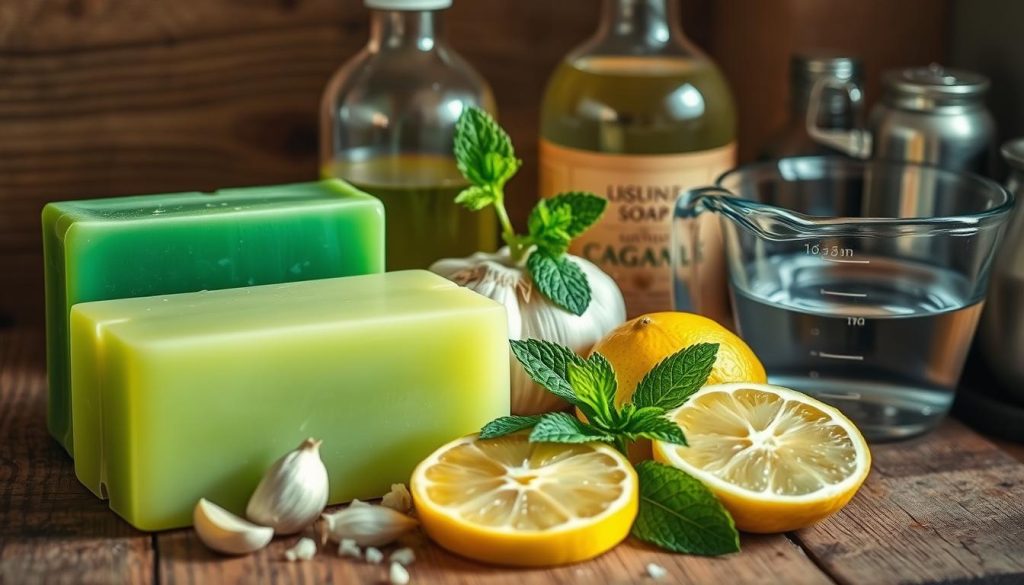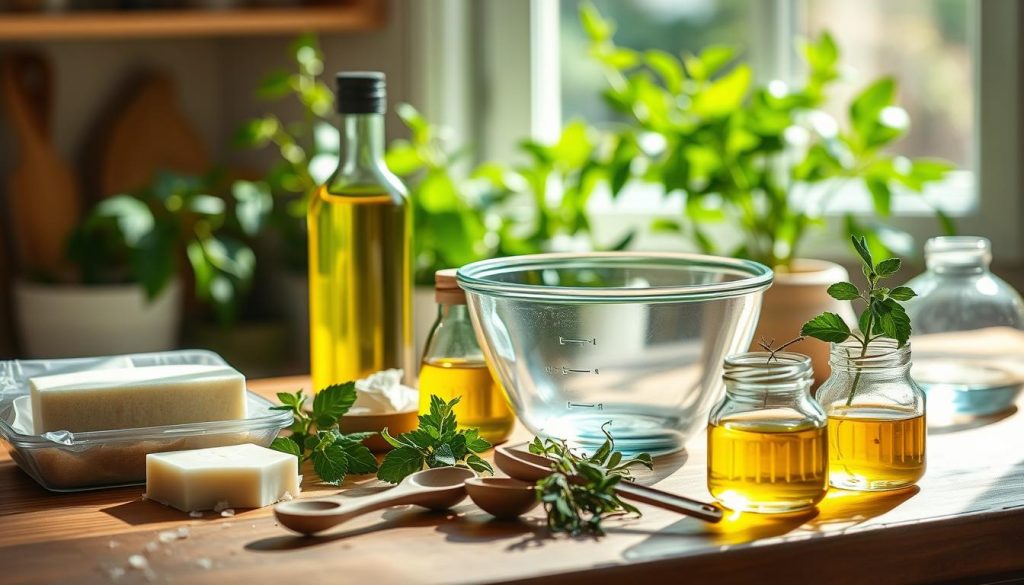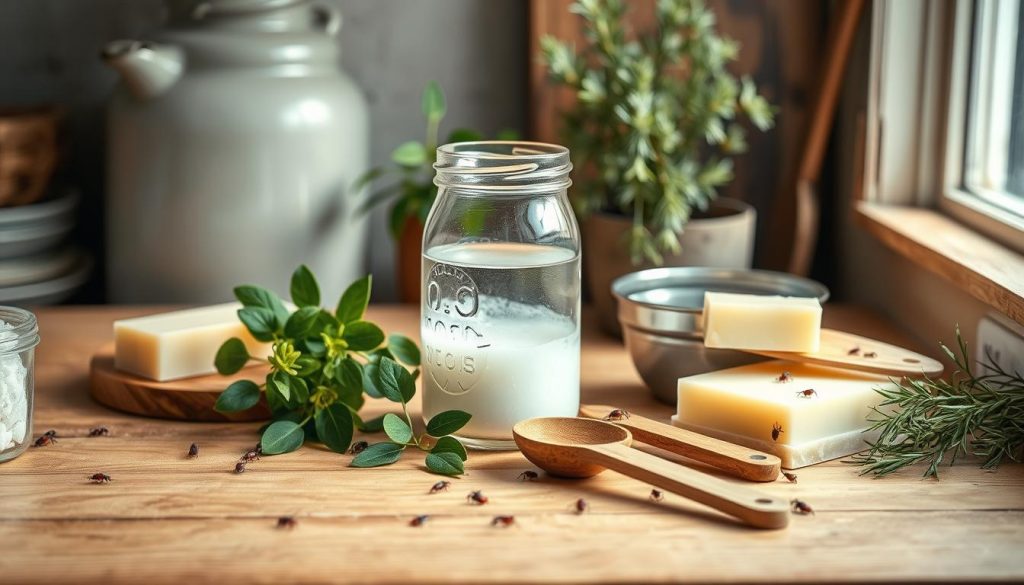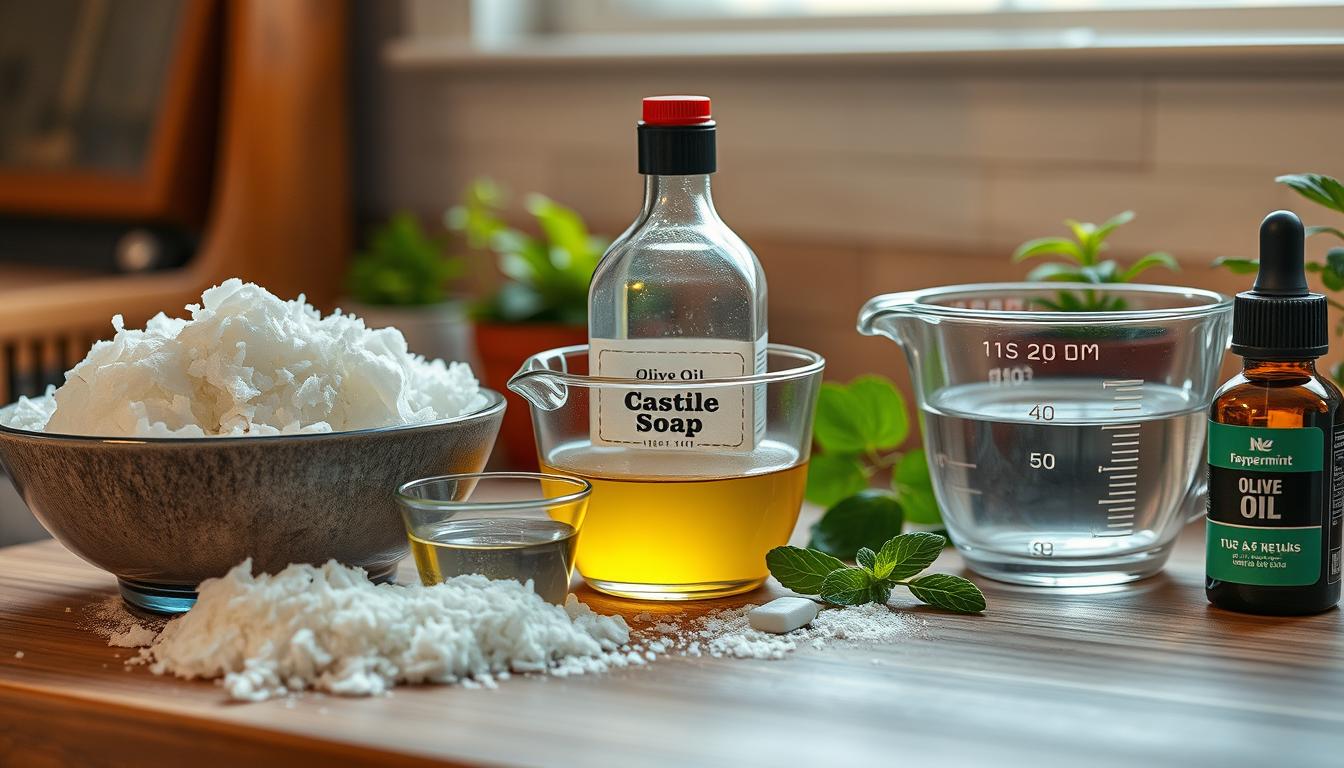I’m excited to share my favorite homemade insecticidal soap recipes. They are easy to make and effective in controlling pests in your garden. These DIY recipes are eco-friendly and cost-effective, making them a great alternative to commercial insecticides.
Using natural insecticidal soap is a great way to keep your garden healthy and pest-free. With these homemade recipes, you can create your own natural pest control solutions. They are gentle on the environment and safe for your plants.
I’ll provide you with a list of simple and easy-to-follow recipes to try at home. I’ll also share some tips and tricks for using them effectively. Whether you’re a seasoned gardener or just starting out, these homemade insecticidal soap recipes are a great way to take control of your garden’s pest management. They offer a more natural approach with DIY insecticidal soap.
Understanding the Benefits of Insecticidal Soap
As a gardener, I’ve learned the value of eco-friendly pest control. Homemade insecticidal soap is a gentle and effective method. It’s made from simple ingredients and offers many benefits for your garden.
Insecticidal soap is designed to kill pests like aphids and spider mites. It’s a mix of soap and oil. Making your own can be safer and more effective than store-bought options. This approach helps you garden in a way that’s better for the environment.
- Targeted pest control: Insecticidal soap can be used to target specific pests, reducing the risk of harming beneficial insects.
- Environmental benefits: Eco-friendly insecticidal soap is a more sustainable alternative to chemical-based pesticides, reducing the risk of soil and water pollution.
- Cost-effective: Making your own insecticidal soap at home can be a cost-effective way to control pests in your garden.
Using insecticidal soap in your garden can make it more balanced and sustainable. Whether you make your own bug spray or pest control, the goal is to find what works best for you and your garden.
Essential Ingredients for Homemade Insecticidal Soap
To make a homemade organic insecticide, you need a few key ingredients. These are soap, oil, and water. You might already have dish soap and vegetable oil at home. Choose a mild dish soap without harsh chemicals or fragrances to protect your plants.
A homemade plant spray is made by mixing soap, oil, and water. The soap breaks down the oil, making it mix with water. This creates a solution you can spray on your plants. You can use:
- Mild dish soap
- Vegetable oil
- Water
You can also add optional ingredients to make your homemade insecticidal soap better. Adding garlic or hot pepper can help keep pests away. 
Common Ingredients You Probably Have
Most ingredients for homemade insecticidal soap are probably in your kitchen. Using these common items, you can make a plant spray that works well and is gentle on your plants.
Optional Additives for Enhanced Effectiveness
Think about adding optional ingredients to your homemade insecticidal soap. Garlic, hot peppers, or other natural pest deterrents can help. By trying different ingredients, you can make a homemade organic insecticide that fits your needs.
Simple Recipes for Homemade Insecticidal Soap
To make effective homemade insect repellent, you need the right recipes. I’ll share simple recipes for homemade insecticidal soap. These are great for beginners and need just a few ingredients.
Using natural insecticidal soap is a good way to keep your garden pest-free. With these recipes, you can make your own repellent. This will help your garden stay healthy and thrive.
Basic Insecticidal Soap Recipe
This basic recipe is a good start for homemade insecticidal soap. You’ll need:
- 1 cup of water
- 1 tablespoon of mild dish soap
- 1 tablespoon of white oil
Mix these ingredients and spray them on your plants to keep pests away.

Citrus-Infused Soap Recipe
This recipe adds a citrus twist to the basic one. It’s even more effective against pests. You’ll need:
- 1 cup of water
- 1 tablespoon of mild dish soap
- 1 tablespoon of lemon juice
Mix these ingredients and spray them on your plants. This keeps pests away and adds a natural touch to your garden.
Tips for Application and Usage
Now that you’ve made your own insecticidal soap, it’s key to know how to use it right. The best times to apply it are early morning or late evening. This is when pests are most active.
To make sure it works, spray the soap directly on leaves and stems. Keep your homemade soap in a cool, dry place. Store it away from sunlight and children.
Best Practices for Application
- Always read the label and follow the instructions for the specific homemade insecticidal soap recipe you are using.
- Wear protective clothing, including gloves and eyewear, to avoid skin and eye irritation.
- Test a small area of the plant before applying the soap to ensure it doesn’t cause any damage.

Safety Precautions to Consider
When using homemade insecticidal soap, safety is crucial. Don’t apply it during peak sun hours or in extreme weather. This can reduce its effectiveness or harm your plants. By following these tips, you can keep pests away while keeping your garden safe and healthy.
Troubleshooting Common Issues
Using homemade insecticidal soap can sometimes lead to problems. If it doesn’t work, check your recipe. Make sure you included all ingredients and followed the steps correctly. You might also want to try adjusting the soap’s strength or mixing it with other pest control methods.
Some plants might react badly to the soap’s ingredients. Before using it on your plants, test it on a small area. You can also make the recipe milder or dilute the soap with more water to avoid damage.
What to Do if It Doesn’t Work
- Check the recipe and ingredients
- Adjust the concentration of the soap
- Use it in combination with other Homemade pest control methods
Identifying Plant Sensitivity
Look for signs of plant sensitivity like yellow or brown leaves, or damage to stems and flowers. If you see these signs, stop using the soap right away. Try a different recipe or method. By troubleshooting and identifying plant sensitivity, you can keep your plants healthy and pest-free.
Additional Resources and References
If you want to learn more about natural pest control, there are great resources out there. Check out “The Organic Gardener’s Handbook of Natural Pest and Disease Control” by Fern Marshall Bradley and Barbara W. Ellis. It’s full of tips on making eco-friendly solutions for your garden.
Recommended Books for Natural Pest Control
Also, “Organic Pest Control: A Guide to Naturally Controlling Insects, Pests, and Diseases in Your Garden” by Steve A. Wells is a must-read. It teaches you how to use natural ingredients like insecticidal soap to keep your plants healthy.
Online Communities for Gardening Support
Looking for a community of gardening fans? Try GardenWeb or Reddit’s r/Gardening subreddit. These places let you connect with other gardeners, ask questions, and share your experiences with homemade insecticidal soap and more.
As you keep working on your eco-friendly garden, I hope these resources help. Happy gardening!

